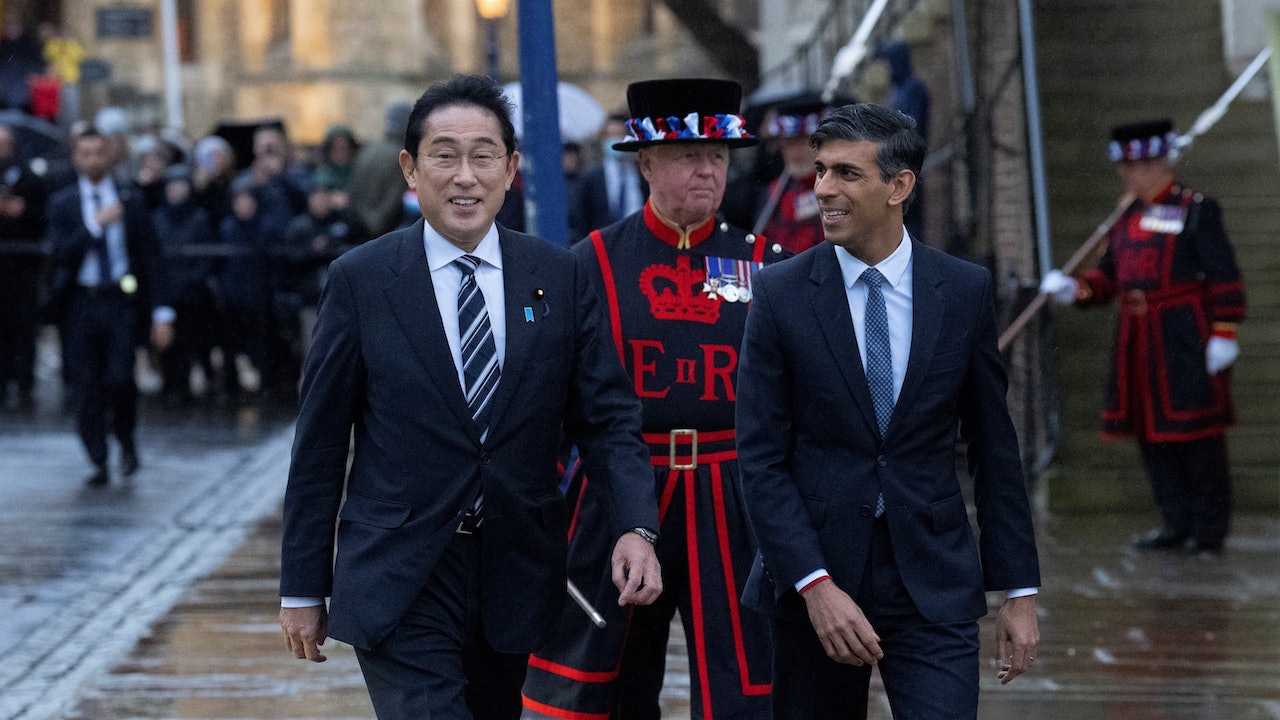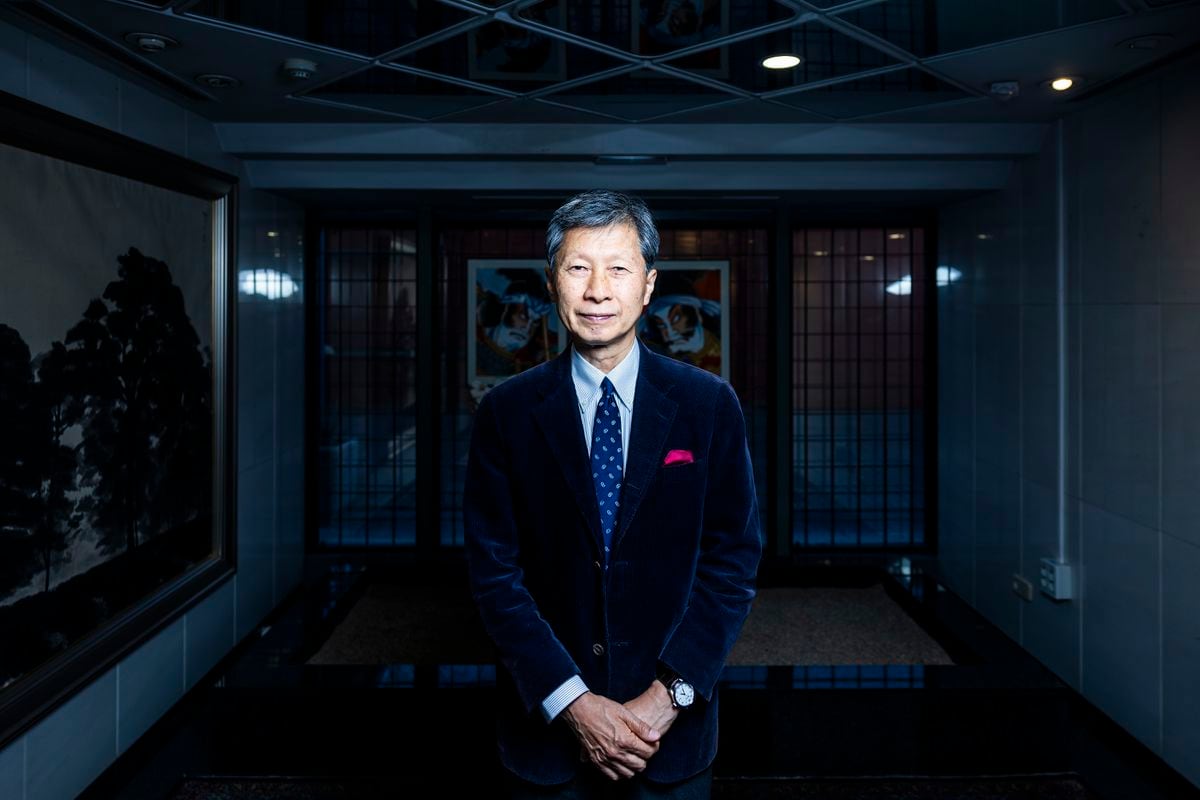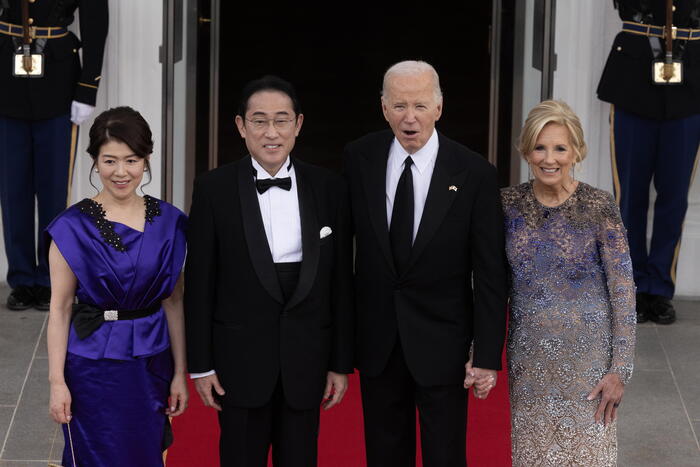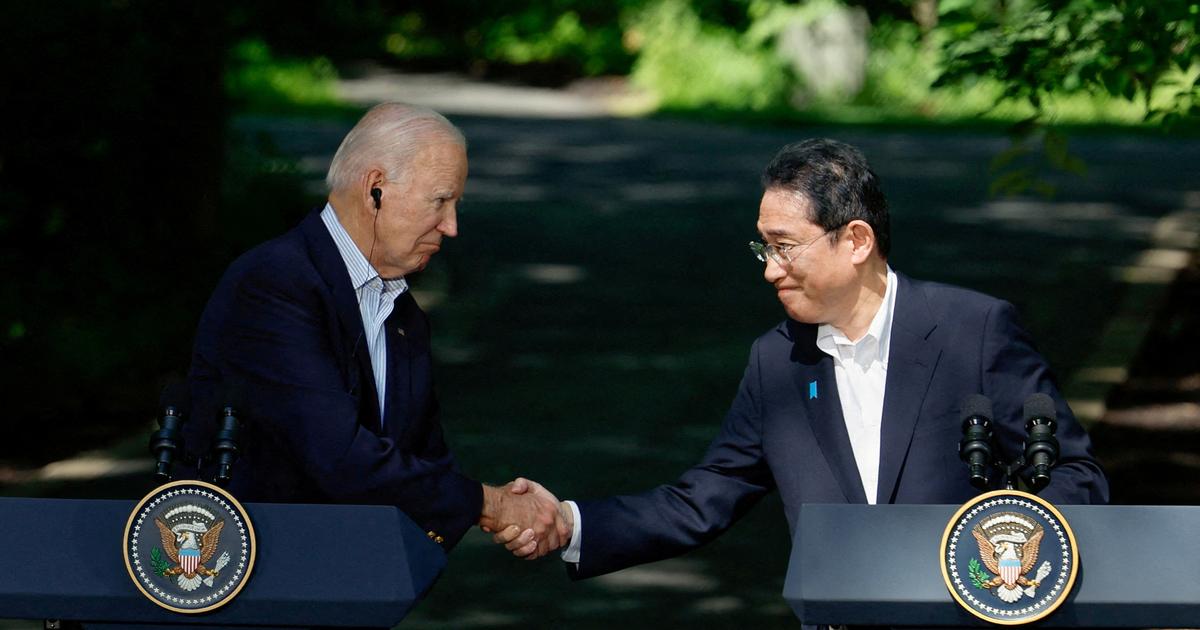On January 11, Japanese Prime Minister Fumio Kishida came to the third stop of his trip to the United Kingdom. He signed the 27-page "Japan-UK Mutual Access Agreement" with British Prime Minister Rishi Sunak, establishing the The various details of the two sides deploying armed forces on each other's territory made Britain the second country after Japan to negotiate a mutual access agreement (RAA) after Australia, and the first European country to reach an RAA with Japan.
Unlike Kishida's previous visits to France and Italy, and his subsequent visit to Canada (the United States on the 13th), where everyone "discussed" security cooperation, the "Japan-UK RAA" is a document with practical significance. After Kishida and Xin Weicheng signed the agreement, It needs the approval of the Congresses of the two countries to implement it.
Xin Weicheng alluded to the past of the 1902 "Japan-British Alliance" against Tsarist Russia at the time of signing, and today's Japan-British RAA does have the shadow of this alliance of a century ago.
According to the official release of the Ministry of Foreign Affairs of Japan, the "background" of this Japan-UK military cooperation is two challenges to the existing international order: one is "Russia's invasion of Ukraine" and the other is "in the East China Sea and South An attempt by the China Sea to unilaterally change the status quo by force" - no name was named, but everyone knows that the protagonist of this attempt is China.
This agreement is actually not the first signal that Japan-UK military relations are getting closer.
Previously, in September 2021, the new British aircraft carrier HMS Queen Elizabeth came to the Indo-Pacific region to visit Japan on its first voyage, and conducted its first exercise with the Japanese Self-Defense Force.
Since then, two British patrol ships have been stationed at the US Naval Base in Yokosuka.
Of course, unlike the world situation more than a hundred years ago, the main players in international politics in the "post-post-Cold War era" today are China and the United States.
Even for Russia, which caused an uproar by invading Ukraine in 2022, the important background factors for its actions are inseparable from the growth and decline and competition between China and the United States. If China is still a weak and populous country and has to conform to the Western "international order", Or if the United States does not have an "Indo-Pacific turn" but still takes the Atlanticism of the Cold War era as the main axis of diplomacy, will Putin attack Ukraine so rashly?
Kishida and Xin Weicheng met in the Tower of London, which was once the royal residence and prison.
(Reuters)
Opportunities for "Containing China"
Although China denies the inevitability of the "Thucydides Trap", at this moment the United States has clearly adopted a "containment policy" towards China.
The trade war launched in the Trump era and the technological suppression mainly targeting Huawei, from the perspective of the 2020 China-US phase one trade agreement that only requires China to buy more American goods, have no far-reaching strategic considerations behind it.
But such reckless actions have established a bipartisan consensus in the United States to suppress China's rise: from Joe Biden, the representative of the Washington establishment, to the far-right Republican Congressman Green ( Marjorie Taylor Greene), "Anti-China" has the same intention.
The "containment policy" of the Biden administration was fully revealed in the ban on chips to China announced in October. This law imposes one-size-fits-all semiconductor export restrictions on Chinese companies, and even prohibits American citizens from serving China's semiconductor development. It has torn up the old excuse that a Chinese company poses a threat to US national security.
The other side of the "containment policy" is the ally diplomacy emphasized by Biden.
In the semiconductor industry, the United States is actively wooing the Netherlands, Japan, and even South Korea to join the US-led encirclement network against China.
In terms of military affairs, the United States encourages allies to increase military investment to serve the geopolitical interests of the United States.
U.S. President Joe Biden attended the moving ceremony of TSMC's new factory in Arizona on December 6. He took this opportunity to emphasize that his policy has allowed the job market to grow, and pointed out that TSMC's expansion of investment is "hopeful to change the rules of the game."
(Facebook/American Institute in Taiwan AIT)
This type of geopolitical development in the new era has led to the situation of great powers striving for hegemony, rekindling the "great power dream" that many countries with a history of colonialism and imperialism want to participate in changing history again.
"Global Britain" and "The Sun Never Sets"
In the United Kingdom, the background of leaving the EU is actually the imagination that the United Kingdom can fight alone in the vast sea of the world, and believes that the various norms of the European Union are just binding hands and feet for the United Kingdom.
The "Global Britain" (Global Britain) proposed by the Remainer Theresa May, who came to power after the Brexit referendum, to cater to the Brexiteers, actually has the shadow of "the empire on which the sun never sets."
This kind of historical imagination is certainly out of touch with reality—a major European criticism of Brexit is that “there are two kinds of countries in Europe: small countries and small countries that don’t know they are small countries”—but of course imagination does not have to conform to reality .
The "British-Japanese RAA" at this moment can be regarded as the practice of "global Britain" taking advantage of the competition between China, the United States and China and Japan in the military dimension.
Just like the Queen Elizabeth II's decision to go to the Indo-Pacific on its maiden voyage, this military agreement with Japan was also negotiated during the tenure of former Prime Minister Boris Johnson.
The connection between Brexit, the global UK and the UK's Indo-Pacific policy is self-evident.
At the moment, the Indian Prime Minister Xin Weicheng, although he does not have the England-based atmosphere of Johnson, is also a supporter of Brexit.
(Interestingly, not only Xin Weicheng, but even Johnson himself is a descendant of Turkish immigrants.)
But in the imagination of this "global Britain", the British with the "dream of a great power" have to accept a contradiction: the empire on which the sun never sets is the protagonist of international politics, but global Britain can only be a pawn in the geopolitical layout of the United States.
Xin Weicheng and Kishida visited the exhibits of Japanese samurai armor at the Tower of London.
(Reuters)
Japan's "China Threat Theory"
Another country with a "dream of a great power" is of course Japan.
Since the defeat of militarism in World War II, a small group of right-wingers in Japan have always been unwilling. So far, they have become a force to revise the pacifist constitution after being moderated in public relations.
Japan's "dream of a big country" is not like the "sun never sets" like the UK, but at least it wants to maintain its status as a big country in East Asia.
However, the cruel reality is that, judging from the development of population and population composition, it is impossible for Japan to be a big country in East Asia. former colony” Korea.
The China threat theory has become the solution for the Japanese right wing to aim at the rise of China and try to reverse the trend of history.
On the one hand, if Japan wants to prevent China from dominating East Asia, it must rely on the United States, advocating that China’s threat is Japan’s sharp weapon to achieve its own geopolitical goals from the Sino-US competition.
In recent years, the concept of "free and open Indo-Pacific" that the United States has used to build an anti-China front in Asia, and even the rebirth of the "Quad" (Quad) between the United States, Japan, India and Australia, is actually behind the former Japanese Prime Minister Shinzo Abe.
On the other hand, advocating threats can also subdue pacifist tendencies in Japan and make the public more supportive of Japan's military expansion and even revision of the pacifist constitution—after all, these are just "passive responses" to "threats."
Kishida will meet with Biden on January 13.
(Reuters)
The imagination of a great power is finally limited by reality
In the new era of Sino-US competition, the "dream of a great power" is not limited to Britain and Japan.
For example, France under the rule of Emmanuel Macron has always hoped that when the world moves towards the power poles of China and the United States, it will break away from the legacy of World War II and the Cold War and be dominated by the United States, and then establish another world centered on "Europe". A center of gravity.
France has always been a reluctant member of NATO and the U.S.-European alliance—after all, France is still the only country in Europe that has the remaining colonialist radiation capabilities throughout the Americas, Africa, and Asia, and geographically, it is actually just a corner of Asia. , Europe, which is not a "continent" at all, is of course also a product of the arrogance of the imperialist history.
The historical sympathy behind Europe as the center of power is really obvious.
It is worth noting that France has also strengthened its military cooperation with Japan in the Indo-Pacific region in recent years.
During Kishida's visit to France and the meeting with Macron, Indo-Pacific security was the theme, and the two sides also decided to hold a "2+2" meeting between the foreign ministers and defense ministers of the two countries in the first half of this year.
After failing to use counter-terrorism in West Africa in recent years to build European military power, France's future actions in the Indo-Pacific are definitely worthy of attention.
Another country that still has the "dream of a great power" is of course Russia.
If it weren’t for Putin’s understanding of the history of Kievan Rus’ sole successor state, or the imagination that Belarus, Ukraine, and Russia were originally a family with blood thicker than water, the Russo-Ukrainian war in February last year would have been impossible to talk about, even if The same is true of the fact that Russia has the support of its Chinese allies in the east and the support of the US Indo-Pacific pivot in the west.
As Putin experienced on the battlefield in Ukraine, people's political imagination is often limited by reality.
As a social construction, international politics has no objective reality, but exists between objective reality and people's imagination.
After all, the "Thucydides Trap" used to describe the tendency of emerging powers to war when they threaten the international hegemony of existing powers is not a law of nature.
However, if people's imagination is too incompatible with the objective reality, those who act on imagination can only kneel before the cold reality.
This is also a lesson that politicians who have unrealistic "big international" for various reasons should bear in mind.
The anti-epidemic measures for entry are accused of discriminating against the yellow carded Sino-Korean relations, British and Japanese military mutual access: Xin Weicheng thinks that the United Kingdom is still the United Kingdom in 1902?
Interpretation of Qin Gang's statement on Russia-Ukraine: China won't be unable to come out after a thousand calls. Is Russia's reshuffle going to be a military decision or a political decision?



/cloudfront-eu-central-1.images.arcpublishing.com/prisa/DH2SXR3OWJG27DGCQVSC5AQDNE.png)










